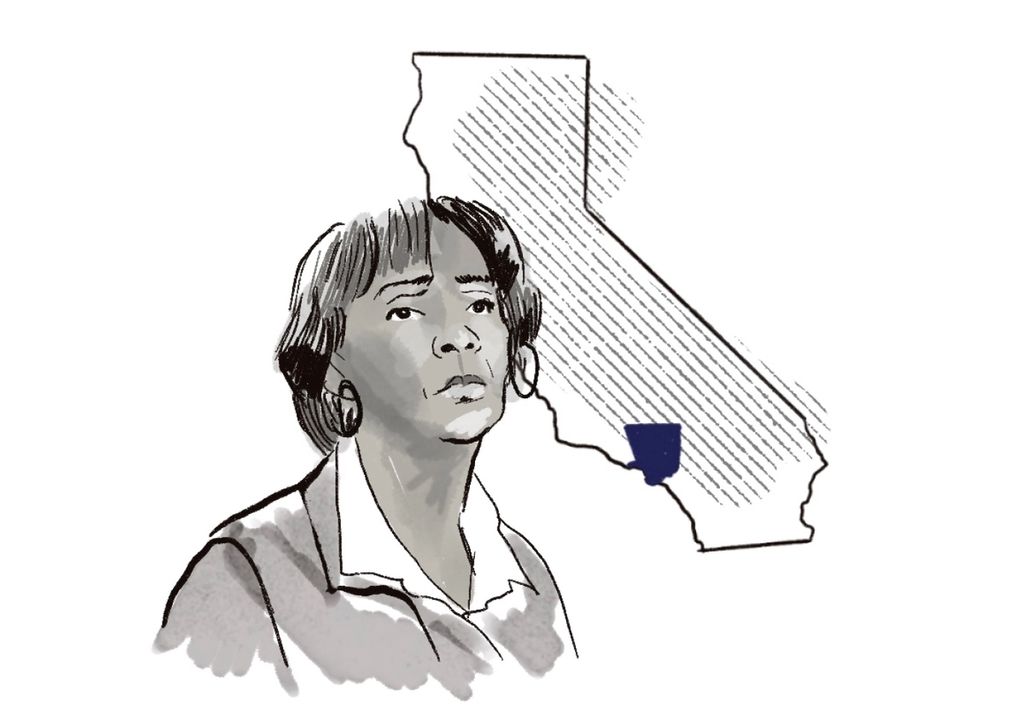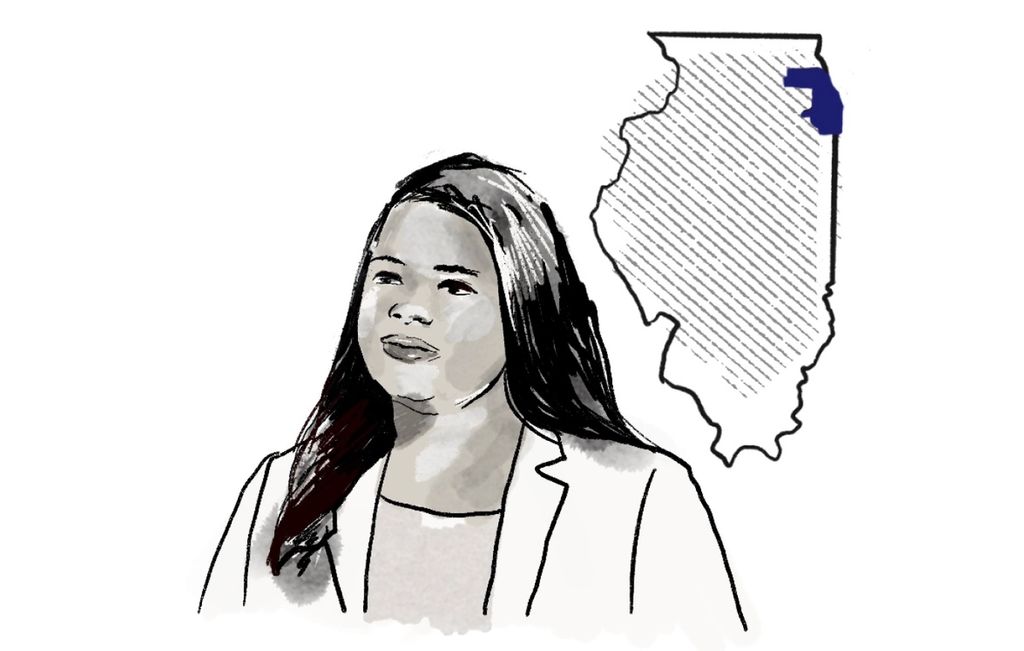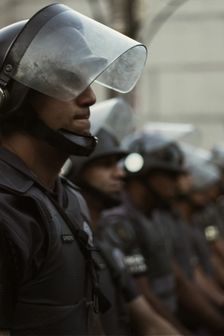District Attorneys
In this section, you'll receive a primer on the responsibilities of a district attorney and investigate the factors that demotivate some prosecutors from convicting guilty cops.
You'll also learn how you can hold your District Attorney accountable.

THEY HAVE THE POWER TO PROSECUTE DIRTY COPS
If you’ve watched a Law and Order rerun, you may some idea of what a District Attorney (or prosecutor) does. District Attorneys (DAs) can decide the fate of people accused of crimes in your community—including police officers charged with acts of brutality.
A district attorney's responsibilities
- Reviewing arrest reports and investigating evidence
- Deciding whether to bring criminal charges against people who have been arrested
- Prosecuting criminal cases in court
- Offering plea deals
- Learn more about the responsibilities of a DA
According to TheOutline.com, "More than 90 percent of state and federal criminal convictions are the result of guilty pleas, often by people who say they didn't commit a crime."
In a plea bargain negotiation, the DA determines the defendant’s sentence behind closed doors. One quick decision by a DA can change the course of someone’s life forever. Research demonstrates that white defendants charged with misdemeanors who had no prior criminal history were 46 percent more likely to have all charges carrying a potential sentence dropped or reduced in comparison to Black defendants with similar charges.
This demonstrates the power a DA wields in the pursuit of justice. However, many people aren't aware of the power DAs hold, or that we elect them.
Source: Equal Justice InitiativeWhat’s their relationship with the police force?
DAs and police departments are heavily dependent on each other. How impartial can a district attorney be about police brutality if part of their success depends on their relationship with police?
DAs need substantial evidence from cops in order to charge and prosecute people accused of crimes. Detectives want those arrested to be properly charged and sentenced. As a result, they collaborate closely.
But what happens when the people committing crimes are police officers?
Low misconduct conviction rates. This relationship can often impact their ability to be impartial.
99% of police killings aren't charged
Conflict-of-interest laws have been presented as one potential method for checks and balances. These laws invite courts and lawmakers to review whether personal and professional relationships have resulted in prosecutorial bias in cases against the police. They examine police prosecutions to ensure the district attorney's decision making process when reviewing evidence was fair.
Applying conflict-of-interest law to local prosecutions of police reveals a disturbing picture of a prosecutor, accustomed to playing on the same team as law enforcement, who must switch roles when police become suspects and defendants.
Source: Iowa Law Review
Jurors also play a role in this. They rarely want to convict police officers which ends up discouraging district attorney's from pursing cases they don't feel they can win. The lack of frequency in cases against police officers is one factor that experts believe contribute to this. If a juror member rarely sees an officer on trial it can feed into their assumptions that officers are rarely guilty of misconduct because they are an authority figure.
A lot of prosecutors believe losing a case over police conduct is worse than not prosecuting one at all. Primarily because of the impact on the families and the message it sends to the victims and their families.
Historically, most jurors have had a presumption in favor of the police officers... In most cases, jurors go into a case looking for reasons to convict. In police misconduct cases, they are searching for reasons to acquit.
Source: Human Rights Watch
Here's another reason: when police unions get involved in a DA’s election, a conflict of interest occurs. This relationship is another big barrier to justice in police misconduct cases. Police unions have found a clever and effective way to evade accountability: endorse DA candidates who align with their views and donate generously to their campaigns.
Then some DAs will return the favor, declining to prosecute cases that involve police officers. DAs want to keep police unions happy, so they can keep winning elections.

When DAs side with police: A micro case study on Jackie Lacey
Jackie Lacey served as DA in Los Angeles from 2013-2020. In 2019, Lacey was running for re-election against George Gascón, a former cop. He was campaigning on a platform of progressive reforms, including stricter oversight of police use of force.
An investigation by the LA Times shows that LAPD union groups donated close to $2.2 million to her campaign. Why did the unions invest so deeply in Lacey? Because she has a reputation of siding with the police instead of addressing officer misconduct. They were also motivated by the threat of Gascón. He was running a campaign focused on restorative justice and officer accountability.
During her tenure, over 600 people have been killed by the LAPD. Only 2 officers have been prosecuted. Here's a deeper look at her record. After years of protests against her (led by Black Lives Matter LA) she was voted out by residents of Los Angeles in November 2020 and George Gascón won the election.
Her prosecutorial record isn’t unique to LA. David Cameron's highly criticized approach to handling Breonna Taylor's case in Louisville is another recent example.

When DAs stay fair: A micro case study on Kim Foxx
Meet Kim Foxx.
Currently a State Attorney in Illinois, she’s now running for office as one of the country’s first “progressive prosecutors” focused on transparency, reshaping the system, and addressing long-standing inequities. She’s been criticized by opponents who say her attempts to transform the system have gone too far.
However, in 4 years, Foxx has:
- Charged 2 police officers involved in fatal shootings
- Vacated 100 wrongful convictions — Chicago’s first mass exoneration
- Sentenced 34% fewer people than her predecessor
- Expunged over 1,000 low-level marijuana convictions after the state legalized marijuana
- Released over 6 years of anonymous data in felony criminal cases outlining what happened in every felony brought to her office and her predecessors
Very rarely do we see DAs demonstrate this level of transparency.
Source: The AppealHow to hold DAs accountable
Thankfully, you can decide your DA’s fate. In 45 out of the 50 states, DAs are elected to 4-year terms, with the option to run for re-election. That being said…
95% win
85% run unopposed
When there are no other candidates, the sitting DAs are elected automatically for another term. They don’t have to justify their decision-making record to the public. They receive little-or-no feedback from voters.
But since the 2016 election, there’s been a surge in people running for local office, and organizations are also doing their part. Take the Real Justice PAC, which helps to recruit and elect candidates with a background in defending civil rights for DA races across the country.
If you want more say in police accountability, vote for a DA who doesn’t support a double standard in sentencing for civilians and officers.

